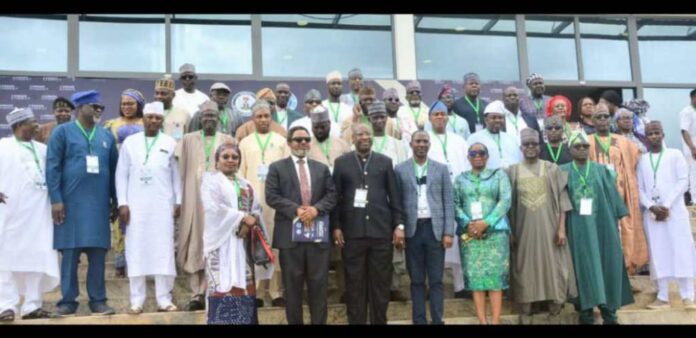
Ime Akpan
The managing director of the Nigerian Airspace Management Agency (NAMA), Mr Umar Farouk, has pleaded with the national assembly to intervene in the 50% deduction of internally generated revenue (IGR) from the agency, saying the practice has crippled its capacity to meet its statutory responsibility, expand capacity, and deliver on international obligations.
Spokesman for NAMA, Dr. Abdullahi Musa said in a statement that the managing director made the plea in his opening remarks at the ongoing 4-day retreat of the house committee on aviation taking place in Abuja.
Recall that the federal government, through a circular from the minister of finance, directed all “super agencies” to remit 50% of their IGR to the treasury single account (TSA).
The move was aimed at improving revenue generation, fiscal discipline, transparency, and accountability in the management of government financial resources.
The policy has continued to cause widespread fear and concern among operators in the aviation sector.
Speaking on the matter, the managing called for the full enforcement of section 9(2) of the NAMA Act 2022 which stipulates that “all fees and charges imposed by NAMA are not subject to deductions or remittance to any other body.”
Farouk stated that the discontinuance of the enforcement of the 50 per cent revenue deduction at source had become imperative to enable NAMA maintain critical infrastructure like towers, radars and communication networks; pay and train thousands of skilled personnel who manage the skies daily; fund critical upgrades like performance based navigation (PBN) and satellite-based augmentation systems (SBAS); and meet International Civil Aviation Organization (ICAO)’s stringent safety standards as well as deliver continuous service to airlines without interruption.
He stressed that adherence to the provisions of Section 9 (2) of the NAMA Act would enable the agency to among other things, fund critical infrastructure, ensure regular maintenance and calibration of communication, navigation and surveillance (CNS) equipment to ensure compliance with ICAO standards, employ and train critical personnel, and invest in digitalization and innovation to remain competitive globally.
Farouk also solicited the lawmakers’ intervention to ensure the implementation of the Obstruction Evaluation Fees Provision in section 18 (1) (a), (b) and (xii) of the same NAMA Act, 2022 which states that “there shall be established and maintained by the agency, a fund into which shall be paid and credited… (b) all fees and funds accruing from… (xii) obstacle evaluation fees.”
He contended that the statutory provision unambiguously empowers NAMA to collect obstruction evaluation fees as part of its mandate to ensure the safety, efficiency and regularity of Nigeria’s airspace, but regretted “the current overlap of roles, where another aviation agency continued to exercise functions statutorily vested in NAMA, and constrained the agency’s capacity to harness this lawful revenue source.”
The managing director also called for comprehensive review of the air navigation charges, which he noted, have been stagnant since 2008. He emphasized that the review required urgent attention to reflect current economic realities and ensure true cost recovery.
Earlier in his address, the chairman, house committee on aviation, Mr Abdullahi Garba expressed the desire of the national assembly to develop actionable plans and reinforce priorities that enhance aviation safety and also improve infrastructure and regulatory compliance.
He noted that the time had come for stakeholders to effectively share expertise and synergise to address the challenges and also tap into the opportunities that abound in the aviation sector.
He expressed confidence that the retreat would significantly strengthen collective efforts to advance the aviation sector in Nigeria.
The retreat, held under the theme ‘Emerging trends in global aviation: sustainability, technology, and digital transformation’, is expected to feature interactive sessions, insightful presentations and collaborative discussions covering areas from airspace management and legislative oversight to stakeholder engagement.
























































